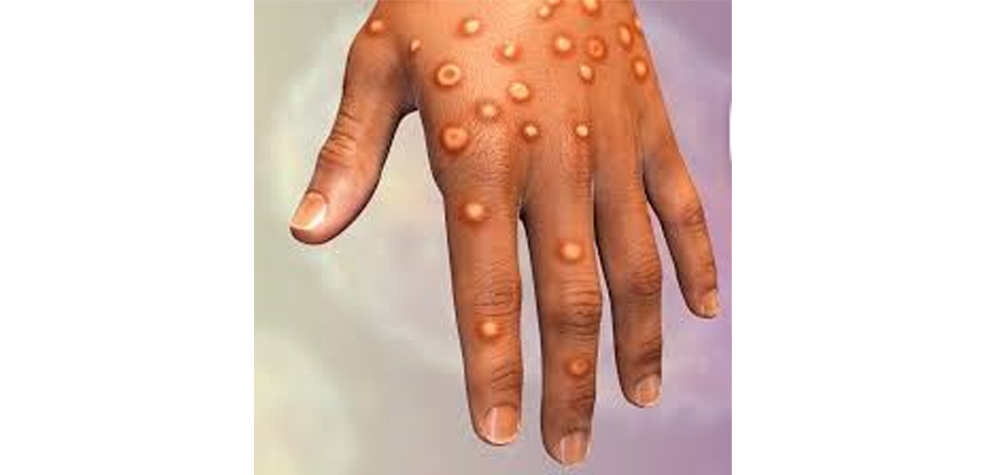by Charles Gladden
BELIZE CITY, Wed. Aug. 21, 2024
A few days ago, the World Health Organization (WHO) declared the mpox virus – formerly known as monkeypox – a public health emergency of international concern after there were outbreaks of the virus in several African regions.
The contagious disease is a viral illness caused by the monkeypox virus, a species of the genus Orthopoxvirus. Two different clades exist: Clade I and Clade II, which originated in Central Africa and West Africa, respectively.
The mpox virus was discovered in Denmark in the 1950s in monkeys being held for research purposes; and in 1970, the first reported case was found in a nine-month-old boy in the Democratic Republic of the Congo.
It is transmitted via physical contact with someone with infectious skin or other lesions such as in the mouth or on the genitals through respiratory droplets, sexual contact, and skin-to-skin contact. After exposure to the virus, signs and symptoms usually begin within a week, but can start 1–21 days later, and symptoms may last for a period of 2-4 weeks or longer.
While the outbreak is centralized within several African regions, it has made its way into Tainan, Taiwan, where three cases have been reported, along with other countries – Pakistan, the Philippines, and Sweden.
In 2022, the Clade IIb version of the virus was detected in London, United Kingdom in someone who had recently visited Nigeria, where the disease is endemic, causing the WHO to declare a public health emergency of international concern, but it was ended in May 2023.
Since then, the concern has risen within this region, as Mexico’s Sistema Nacional de Vigilancia Epidemiológica (SINAVE) issued an epidemiological alert regarding the recent rise in mpox. It highlighted the increased risk of mpox in the country, as there were 7,385 reported cases in Mexico since 2022, with 4,130 of these cases being confirmed—most of which were found in the state of Quintana Roo.
“Now that we’re seeing this increase in cases within Africa, that’s a different clade. That’s Clade 1B. It has been sparking some interest here because of the outbreak of cases, especially among adults and children, and the concern there is that it is no longer a sexual mode of transmission, but it has been moved now towards more direct contact between individuals,” said Dr. Russell Manzanero, Director for Epidemiology Unit for the Ministry of Health. “The concern why it became a public health emergency was the limitations you might see in Africa. You look at the impact they have on the general population; you look at what the health system in existence is there. So, definitely with movement, with people, then you can have that potential spread to other parts of the world,” he added.
According to Dr. Manzanero, in 2022, Clade II was seen as prevalent in high-risk populations such as persons living with HIV or men having sex with men, and there were reported deaths as a result of the illness.
While there are vaccines available in certain locations, Belize doesn’t have them available, but Dr. Manzanero noted that the Ministry of Health and Wellness is looking at that option, but will not be embarking on a vaccination campaign just yet.
“Before you start looking at vaccination procedures, you want to look at the impact on different countries. The availability is limited. So right now, they will start to look at the concerns within Africa. They will target that area and if they can control it at those points, then transmission is lowered,” he explained.
While in the Caribbean, mpox is being monitored as Chair of the Caribbean Community (CARICOM), Hon. Dickon Mitchell highlighted that there are no cases of the disease in the Caribbean, but cases are increasing within the Democratic Republic of the Congo and neighboring countries.
“I urge all citizens to remain alert by staying informed through updates from CARPHA and local health authorities regarding mpox and its transmission. It is important to be vigilant for any unusual rashes or lesions, especially if individuals have a travel history to areas with reported cases of mpox, and seek immediate medical attention if signs or symptoms are detected,” he said.
Common symptoms of mpox are rash, fever, sore throat, headache, muscle aches, back pain, low energy, and swollen lymph nodes.
The rash begins as a flat sore that develops into a blister filled with liquid and may be itchy or painful. Persons may experience one or a few skin lesions, while others have hundreds or more, which can appear anywhere on the body.

